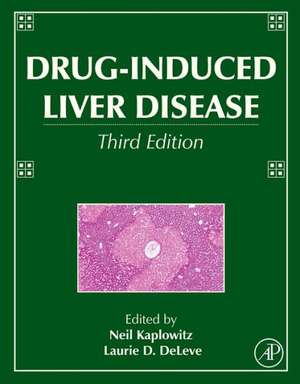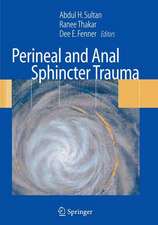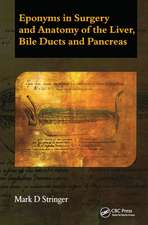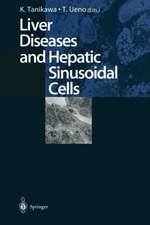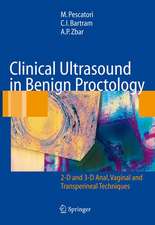Drug-Induced Liver Disease
Editat de Neil Kaplowitz, Laurie D. DeLeveen Limba Engleză Hardback – 20 iun 2013
- A multi-authored reference work written by leading clinical, academic and industry experts in drug-induced liver disease
- Contains four new chapters on key areas in the field, including one on worldwide drug-induced liver injury networks
- Each chapter has been updated to address the latest research and findings in the field and 16 new chapter authors have been added to this new edition
- Includes coverage of the basic, clinical and practical aspects of drug-induced liver disease to provide the single most comprehensive reference on the subject
Preț: 1082.08 lei
Preț vechi: 1430.04 lei
-24% Nou
Puncte Express: 1623
Preț estimativ în valută:
207.08€ • 215.40$ • 170.96£
207.08€ • 215.40$ • 170.96£
Carte tipărită la comandă
Livrare economică 07-21 aprilie
Preluare comenzi: 021 569.72.76
Specificații
ISBN-13: 9780123878175
ISBN-10: 0123878179
Pagini: 776
Ilustrații: 250 illustrations (50 in full color)
Dimensiuni: 216 x 276 x 41 mm
Greutate: 2.31 kg
Ediția:Revised
Editura: ELSEVIER SCIENCE
ISBN-10: 0123878179
Pagini: 776
Ilustrații: 250 illustrations (50 in full color)
Dimensiuni: 216 x 276 x 41 mm
Greutate: 2.31 kg
Ediția:Revised
Editura: ELSEVIER SCIENCE
Public țintă
This reference is geared primarily towards medical specialists, including gastroenterologists, hepatologists, and pathologists, toxicologists, members of the pharmaceutical industry, and regulators. This book also provides an extensive review of mechanisms of toxicity and of drug safety and would be an excellent reference for students of toxicology, as a secondary audience.Cuprins
Part I. Mechanisms of Liver Injury Chapter 1: Drug-Induced Liver Injury: Introduction and Overview Chapter 2: Cytochrome P450 Activation of Toxins and Hepatotoxicity Chapter 3: Mechanistic Role of Acyl Glucuronides Chapter 4: Oxidative Stress, Antioxidant Defense and Liver Injury Chapter 5: Hepatotoxicity due to Mitochondrial Injury Chapter 6: Mechanisms of Cell Death and Relevance to Drug Hepatotoxicity Chapter 7: Role of Membrane Transport in Hepatotoxicity and Pathogenesis of Drug-Induced Cholestasis Chapter 8: Liver Sinusoidal Endothelial Cell and Liver Injury Chapter 9: Macrophages and Kupffer Cells in Hepatotoxicity Chapter 10: Role of Inflammation in Drug-Induced Liver Disease Chapter 11: Role of Adaptive Immune System Chapter 12: Role of Tissue Repair in Liver Injury Chapter 13: Genetic Factors in Pathogenesis
Part II. Diagnosis and ManagementChapter 14: Clinical Manifestations and Management of Drug-Induced Liver Diseases Chapter 15: Histopathology of Drug-Induced Liver Disease Chapter 16: Risk Factors for Drug-Induced Liver Disease Chapter 17: The Promise of Genomics, Proteomics and Metabolomics of Blood and Liver in the Diagnosis of Drug-Induced Liver Disease Chapter 18: Causality Assessment
Part III. Hepatotoxicity of Specific DrugsChapter 19: Mechanisms of Acetaminophen-Induced Liver Disease Chapter 20: Acetaminophen – Pathology and Clinical Presentation of Hepatotoxicity Chapter 21: Mechanisms Underlying the Hepatotoxicity of Non-Steroidal Anti-Inflammatory Drugs Chapter 22: Non-Steroidal Anti-Inflammatory Drugs – Pathology and Clinical Presentation of Hepatotoxicity Chapter 23: Mechanisms, Pathology and Clinical Presentation of Hepatotoxicity of Anesthetic Agents Chapter 24: Anticonvulsant AgentsChapter 25: Psychotropic Drugs and Drugs of Abuse Chapter 26: Hepatotoxicity of Antimicrobials and Antifungal Agents Chapter 27: Antituberculosis Agents Chapter 28: Hepatotoxicity in Antiviral Agents Chapter 29: Hepatotoxicity of Cardiovascular and Antidiabetic Drugs Chapter 30: Cancer Chemotherapy Chapter 31: Hepatotoxicity of Immunomodulating Agents and the Transplant Situation Chapter 32: Methotrexate Chapter 33: Hormones and Hormone Antagonists Chapter 34: Mushroom Poisoning: A Clinical Model of Toxin-Induced Centrilobular Necrosis Chapter 35: Hepatotoxicity and Herbal Medicines, Vitamins and Natural Hepatoxins Chapter 36: Occupational and Environmental HepatotoxicityChapter 37: Chronic Liver Disease from Drugs
Part IV. Future DirectionsChapter 38: Regulatory Perspectives Chapter 39: Drug-Induced Liver Injury Networks Chapter 40: Liver Tox: The Future
Part II. Diagnosis and ManagementChapter 14: Clinical Manifestations and Management of Drug-Induced Liver Diseases Chapter 15: Histopathology of Drug-Induced Liver Disease Chapter 16: Risk Factors for Drug-Induced Liver Disease Chapter 17: The Promise of Genomics, Proteomics and Metabolomics of Blood and Liver in the Diagnosis of Drug-Induced Liver Disease Chapter 18: Causality Assessment
Part III. Hepatotoxicity of Specific DrugsChapter 19: Mechanisms of Acetaminophen-Induced Liver Disease Chapter 20: Acetaminophen – Pathology and Clinical Presentation of Hepatotoxicity Chapter 21: Mechanisms Underlying the Hepatotoxicity of Non-Steroidal Anti-Inflammatory Drugs Chapter 22: Non-Steroidal Anti-Inflammatory Drugs – Pathology and Clinical Presentation of Hepatotoxicity Chapter 23: Mechanisms, Pathology and Clinical Presentation of Hepatotoxicity of Anesthetic Agents Chapter 24: Anticonvulsant AgentsChapter 25: Psychotropic Drugs and Drugs of Abuse Chapter 26: Hepatotoxicity of Antimicrobials and Antifungal Agents Chapter 27: Antituberculosis Agents Chapter 28: Hepatotoxicity in Antiviral Agents Chapter 29: Hepatotoxicity of Cardiovascular and Antidiabetic Drugs Chapter 30: Cancer Chemotherapy Chapter 31: Hepatotoxicity of Immunomodulating Agents and the Transplant Situation Chapter 32: Methotrexate Chapter 33: Hormones and Hormone Antagonists Chapter 34: Mushroom Poisoning: A Clinical Model of Toxin-Induced Centrilobular Necrosis Chapter 35: Hepatotoxicity and Herbal Medicines, Vitamins and Natural Hepatoxins Chapter 36: Occupational and Environmental HepatotoxicityChapter 37: Chronic Liver Disease from Drugs
Part IV. Future DirectionsChapter 38: Regulatory Perspectives Chapter 39: Drug-Induced Liver Injury Networks Chapter 40: Liver Tox: The Future
Recenzii
"This volume is a fascinating read for toxicologists interested in liver toxicity, since it provides an up-to-date view of the many mechanisms of hepatotoxicity… a must-have book which should be kept close at hand, in which case it will be opened regularly by toxicologists concerned with the development and safe use of medications in a practical context." --The British Toxicology Society Newsletter, 2008 (Review of 2nd edition)
